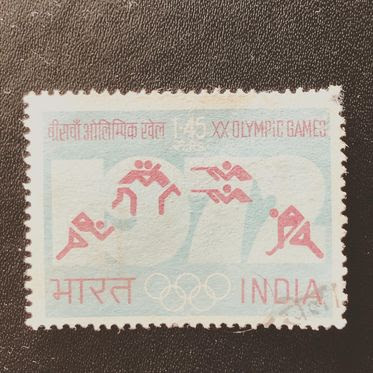Olympic games stamp – India, 1972 was launched to celebrate 20th Olympics games.
Olympic games
The modern Olympic Games or Olympics are the leading international sporting events featuring summer and winter sports competitions in which thousands of athletes from around the world participate in a variety of competitions. The Olympic Games are considered the world’s foremost sports competition with more than 200 teams, representing sovereign states and territories, participating. The Olympic Games are normally held every four years, and since 1994, have alternated between the Summer and Winter Olympics every two years during the four-year period.
Their creation was inspired by the ancient Olympic Games held in Olympia, Greece from the 8th century BC to the 4th century AD. Baron Pierre de Coubertin founded the International Olympic Committee (IOC) in 1894, leading to the first modern Games in Athens in 1896.
1972 Olympics
The 1972 Summer Olympics, officially known as the Games of the XX Olympiad and commonly known as Munich 1972 was an international multi-sport event held in Munich, West Germany, from 26 August to 11 September 1972.
The event was overshadowed by the Munich massacre in the second week, in which eleven Israeli athletes and coaches and a West German police officer at Olympic village were killed by Palestinian Black September members. The motivation for the attack was the ongoing Palestinian-Israeli conflict.
The 1972 Summer Olympics were the second Summer Olympics to be held in Germany, after the 1936 Games in Berlin, which had taken place under the Nazi regime, and the most recent Olympics to be held in the country. The West German Government had been eager to have the Munich Olympics present a democratic and optimistic Germany to the world, as shown by the Games’ official motto, “Die Heiteren Spiele”, or “the cheerful Games”. The logo of the Games was a blue solar logo (the “Bright Sun”). The Soviet Union won the most gold and overall medals.
Interesting facts about Olympics
The first Olympic Games took place in the 8th century B.C. in Olympia, Greece. They were held every four years for 12 centuries. Then, in the 4th century A.D., all pagan festivals were banned by Emperor Theodosius I and the Olympics were no more. However, the athletic tradition was resurrected about 1500 years later: The first modern Olympics were held in 1896 in Greece.
From 1924-1992, the Winter and the Summer Olympics took place in the same year. Now, they’re on separate cycles and alternate every two years.
Tarzan competed in the Olympics: Johnny Weissmuller, an athlete-turned-actor who played Tarzan in 12 movies, won five gold medals in swimming in the 1920s.
From 1912-1948, artists participated in the Olympics: Painters, sculptors, architects, writers, and musicians competed for medals in their respective fields.
During the 1936 Berlin Games, two Japanese pole-vaulters tied for second place. Instead of competing again, they cut the silver and bronze medals in half and fused the two different halves together so that each of them had a half-silver and half-bronze medal.
The Olympic torch is lit the old-fashioned way in an ancient ceremony at the temple of Hera, in Greece: Actresses, wearing costumes of Greek priestesses, use a parabolic mirror and sun rays to kindle the torch.
The unlit Olympic torch has also been taken to space several times.
The six colors – blue, yellow, black, green, red, and the white background – were chosen because every nation’s flag contains at least one of them.
The first official Olympic mascot was Waldi, the dachshund, at the 1972 Games in Munich.
India at 1972 Olympics
India competed at the 1972 Summer Olympics in Munich, West Germany. 41 competitors, 40 men and 1 woman, took part in 27 events in 7 sports. This was incidentally the last Olympics hockey bronze medal that India had won (though India won gold in 1980). India won another Olympics bronze medal after 40 years in 2022.
